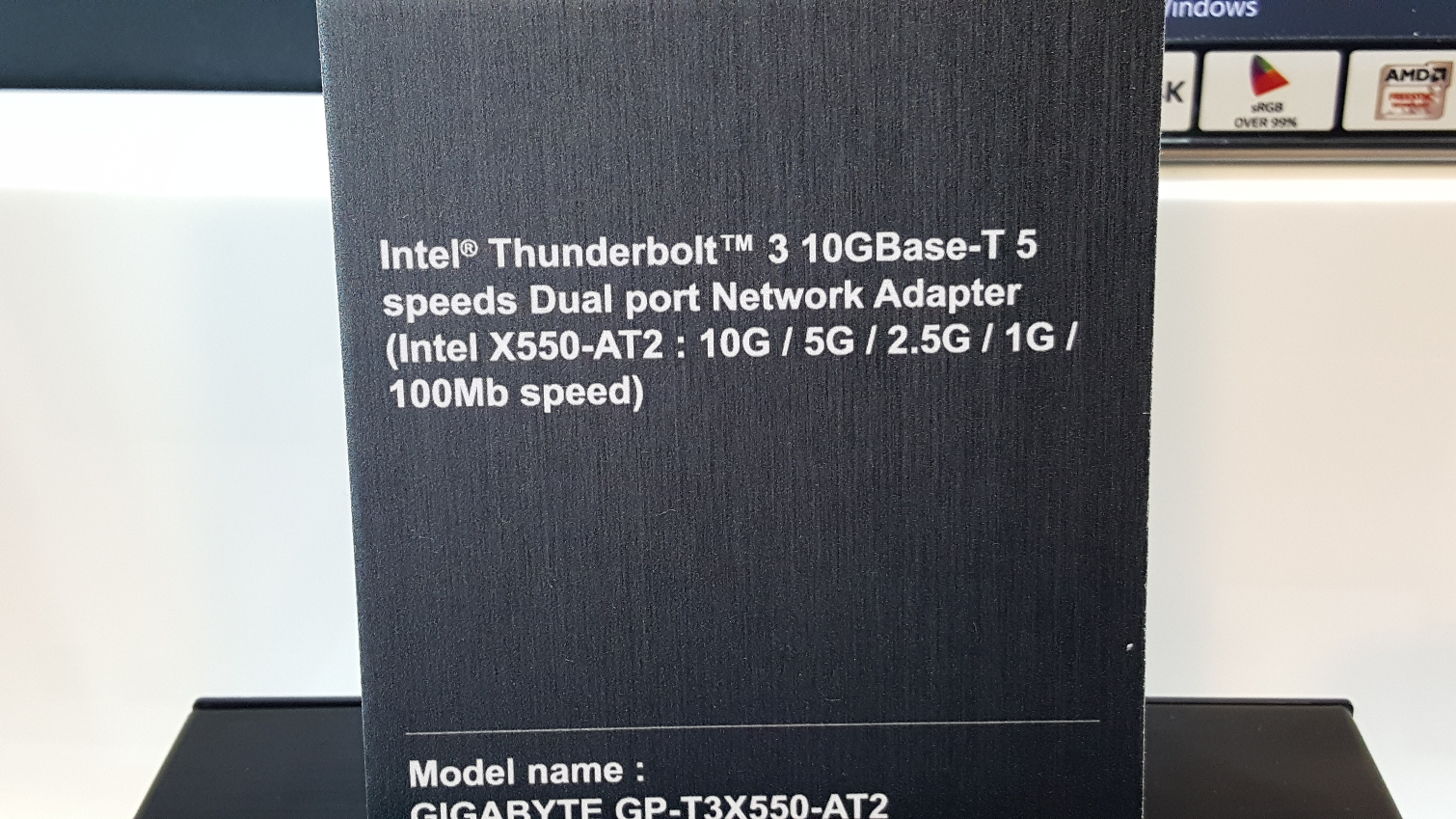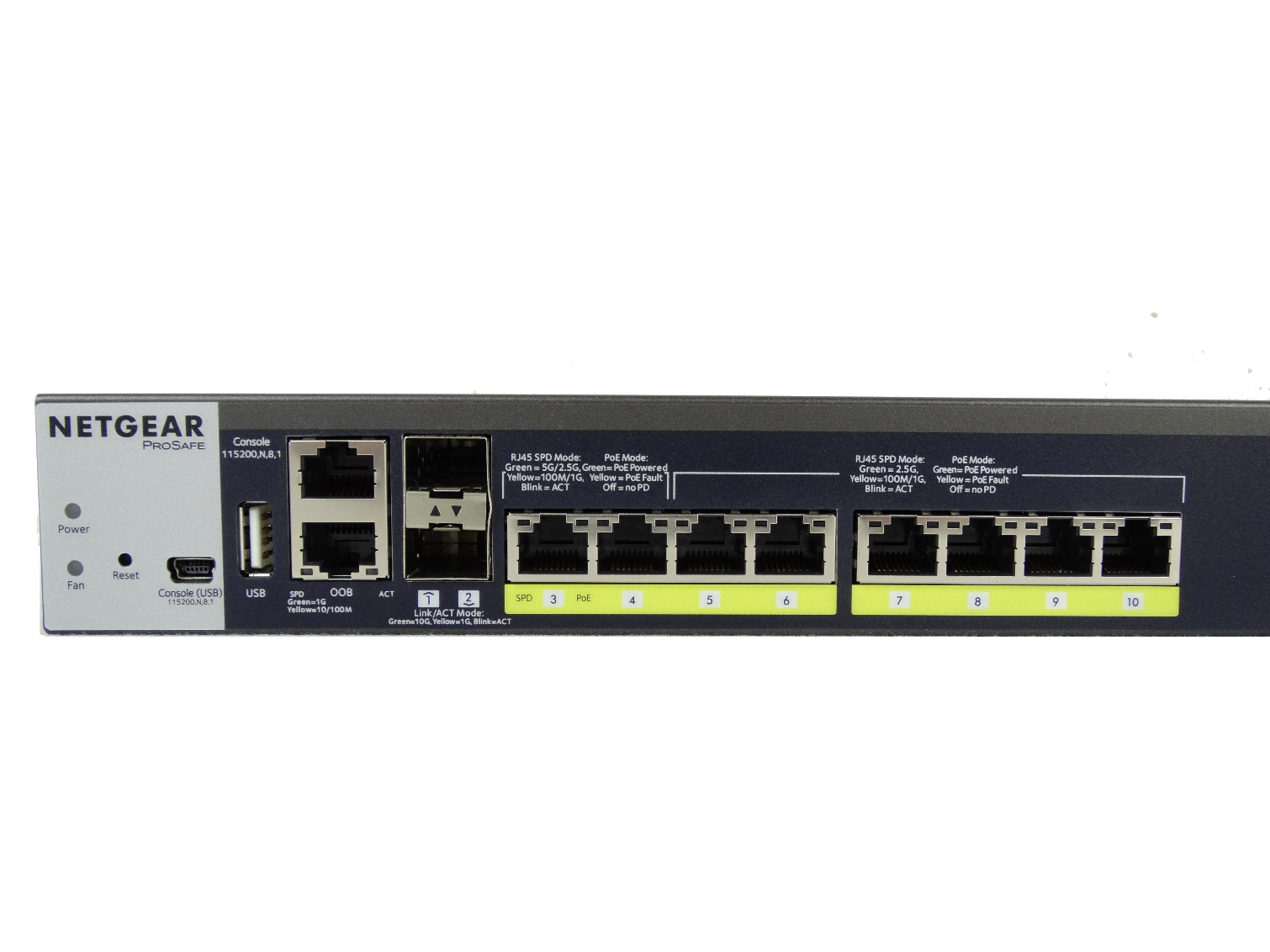Multi-Gigabit Ethernet Spotted At Computex
We've had the Netgear ProSAFE M4200 Intelligent Edge Series switch in our lab for the last two months. This is the first affordable switch to support the 2.5GbE multi-gigabit standard for Wave2 11ac access points. Until Computex, we had no idea how to test the switch because network interface cards were not available.
In the Gigabyte suite, we stumbled across the new Intel X550-AT2 multi-gigabit network interface card (NIC). Intel quietly released the X550 series last month as the successor to the popular X540. The new X550 lowers power consumption and adds 5GbE and 2.5GbE modes.
Gigabyte plans to utilize the new Intel X550 NIC in a Thunderbolt 3 attached device that brings up to 10-gigabit Ethernet support to systems equipped with Thunderbolt 3.
Business First, Professional In 2017
The story here, though, is the two new speed classes that work over existing CAT 5e cabling and increase performance over the industry standard one-gigabit connection that dominates the market today.
The first big push for the new performance class comes from faster-than-gigabit Wi-Fi technology. The first in this new class comes from the 802.11ac Wave 2 standard with up to 1300Gb throughput. The new Netgear ProSAFE M4200 supports 8 power-over-Ethernet (POE) 2.5GbE multi-gigabit (two are 5GbE compatible) connections with dual 10GbE uplinks for eight non-blocking 802.11ac Wave 2 device deployments. The Netgear M4200 currently sells for less than $1,200 at Newegg. This product targets large offices that need high-speed wireless technology to support several users.
The Netgear M4200 feature set includes:
Eight full power PoE+ and multi-speed 1G, 2.5G ports combined with two 10G SFP+ uplinksAllows for a fully non-blocking deployment of eight Wave 2 11ac access points, with 240W PoE budget8 x 2.5G to the access points and 2 x 10G line-rate aggregation to the wiring closetTwo of these multi-speed 1G, 2.5G PoE+ ports also support 5G speed Netgear Multi-gigabit Ethernet is compatible with most major wireless and switching vendors Multi-speed 2.5G / 5G for 100 meter Cat5e / Cat6 cable runs with 1G backward compatibilityPlenum rated, slim design and mounting accessories allow one to place this switch to optimize access points placement and cabling efficiency, inside and outside the rackLifetime hardware warranty, Lifetime next business day and Lifetime online technical chat for investment protection and post-sales support.
Get Tom's Hardware's best news and in-depth reviews, straight to your inbox.
This is just the start of the multi-gigabit roll out, and big businesses will adapt the new standards faster than any other user group. That doesn't mean the technology will stay in the medium- to large-size business arena for long, though. At Computex 2016, we learned that Marvell plans to supply network attached storage (NAS) vendors with the technology for products that will ship as early as January 2017.
Around the same time, we should see more consumer-focused products come to market in the form of routers, switches and high-speed wireless technology with multi-gigabit capabilities. We expect to see more interest in the technology as more products come to market. Multi-gigabit Ethernet is the web that ties new high-speed technologies together, like NVMe SSDs, mobile data connections, and the content that comes with it, such as 4K video and high-bit rate audio.
Chris Ramseyer is a Contributing Editor for Tom's Hardware, covering Storage. Follow him on Twitter and Facebook.

Chris Ramseyer was a senior contributing editor for Tom's Hardware. He tested and reviewed consumer storage.
-
bit_user Reply
Good catch.18115207 said:1300Gb throughput? Must be way ahead of its time to have 1.3Tb throughput! :)
I'm all for faster wi fi speeds, but I'm skeptical you'd actually hit 1.3 Gbps, in real-world conditions. Where I can used a wired connection, I'll continue to do so.
Also, be warned that high-speeds switches tend to be power hungry and therefore noisy.
-
ammaross "...comes from the 802.11ac Wave 2 standard with up to 1300Gb throughput."Reply
In addition to the "1300Gb" typo, 1300Mbps is the 802.11ac Wave 1 speed. Wave 2 allows up to the theoretical max of 6.93Gbps. (of course, this is all half-duplex since it's WiFi) -
ammaross Reply18115244 said:
Good catch.18115207 said:1300Gb throughput? Must be way ahead of its time to have 1.3Tb throughput! :)
I'm all for faster wi fi speeds, but I'm skeptical you'd actually hit 1.3 Gbps, in real-world conditions. Where I can used a wired connection, I'll continue to do so.
Also, be warned that high-speeds switches tend to be power hungry and therefore noisy.
Correct. In real-world conditions (since it's half-duplex), you will likely be worse off than a 1Gbps wired connection anway.
As for loud and power hungry, the switch boasts 28.9dB @ 25°C (77°F) and 281.6 Watts @ full PoE+ (PoE power budget is 240W) so 41.6Watts for the switch.
-
Kewlx25 @AMMAROSS "of course, this is all half-duplex since it's WiFi"Reply
This is not an inherent limitation of wifi, but of our current technology. There is wifi technology in the works that will allow full-duplex wifi on the same frequency. Some pretty nifty noise cancellation tech.

